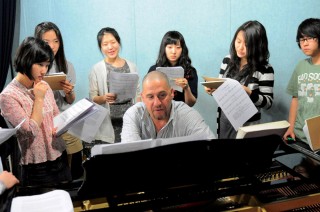Column Name
Title

Mark Sherman with some of his students.
Percussionist Mark Sherman (’80, percussion) has worked the gamut of the New York freelance scene—from the New York Philharmonic and the Joffrey to Broadway and studio work—over the last four decades. More recently he’s focused on being a jazz player, recording artist, and educator. But he still gets freelance calls occasionally and welcomes them. “I’m from the school that says if someone calls you for a gig and you can do it and the music is engaging, do it!” Mark has integrated a lot of his experience into a book called Skills for the Poetic Language of Jazz Improvisation (With School and Career Guidance), which was published by Miles High Music Books in the spring. He also recently released a duo CD, Interplay (Chesky Records), with fellow Juilliard faculty member Kenny Barron.
Body
Where do you teach besides Juilliard?
The New Jersey City University Jazz program and the New York Jazz Workshop. I also have private students in the city and globally on Skype, which has opened a new market in music education. When I perform, I’ve been changing my focus from traditional audiences to reach more mainstream millennial music fans. They like to try new things, and while my instrumentation and sound have been part of the scene for a long time, they’re new to people who don’t know much about the music and are curious about it. It’s nice whether I’m working with friends who are at the top of their crafts or with my new group, the Mark Sherman 4tet.
When did you first know you wanted to be a musician?
I grew up in a musical family. My mother, soprano Edith Gordon Ainsberg (Postgraduate Diploma ’48, voice) had a great career as an opera singer. Gian Carlo Menotti chose her for the role of Lucy in The Telephone on Broadway. I got to watch her sing with Bernstein and many other greats. I had piano lessons from age 8 and started playing drums at 13, and then I went to the High School of Music and Art [now called La Guardia High School of Music & Art and Performing Arts]. I think that was where I first really knew music was my calling. I was studying with Justin DiCioccio there and at Manhattan School’s Precollege. At Juilliard, I studied with Saul Goodman (faculty 1940-81), the timpanist with the New York Phil for nearly 50 years, and other greats, like Buster Bailey (Diploma ’49, percussion; faculty 1969-93), and Roland Kohloff (Diploma ’57, percussion; faculty 1978-2006).
What do you wish you’d known more about when you were leaving Juilliard?
- The business generally.
- The dos and don’ts of dealing with contractors.
- The politics and profiling that occur within each area of the music business.
- I wish I’d had a better perspective on making money versus making music—and the important value of both. Part of the reason I wrote my book was to help other people learn about all these things.
Tell us about making the transition from student to faculty?
One of the greatest things is that I’m always near the percussion area on the third floor, where I grew up spending 15 hours a day, practicing and doing what I needed to do. And some of my best friends growing up are also part of the Juilliard faculty. Dan Druckman (Pre-College ’76; BM ’80, percussion) is the head of the percussion department, and Kenny Washington [jazz faculty] were at Music and Art with me, and Rodney Jones [jazz faculty] and I have been jamming together since we were about 14. Plus my Juilliard classmate Wynton Marsalis (’81, trumpet) is the head of our incredible jazz program. So for me there was no real transition—it’s always felt like family.
What are your nonmusic interests?
Baseball, golf, and the beach. I’ve played and coached baseball quite a bit over the years, and I taught baseball throwing and hitting mechanics for more than 25 years privately and at baseball camps, though I closed the camps a few years ago as I got too busy with music in the summers. I used to have a batting cage in my house.
What are you reading or listening to?
I’m reading Deepak Chopra’s The Seven Spiritual Laws of Success, which looks deeply into the human mind and heart. I’ve been listening to Ella Fitzgerald’s The Cole Porter Songbook—she represents the ultimate in artistry. Since I come from an operatic background, I love the voice and try to emulate it in my own playing—I try to sing with passion instrumentally. Ella has the greatest combination of phrasing, sound, emotion, and delivery of the lyric.
If your students could only remember one thing from your teaching, what would it be?
Be a well-rounded musician who stays true to his or her dream!




